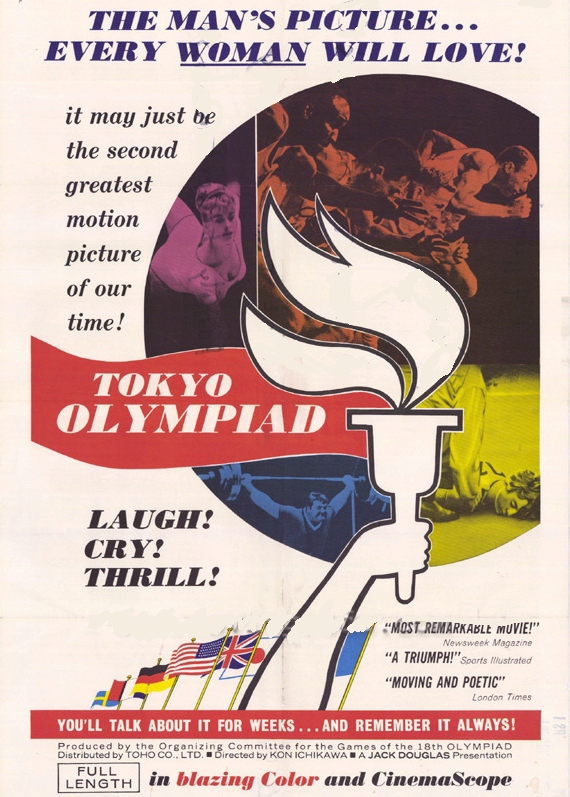- Tokyo Olympiad
Infobox Film | name = Tokyo Olympiad

caption =
director =Kon Ichikawa
producer =Suketarō Taguchi
writer = Kon Ichikawa
Ishio ShirasakaShuntarō Tanikawa Natto Wada
starring =
narrator = Ichiro Mikuni
music =Toshiro Mayuzumi
cinematography =Kazuo Miyagawa
editing =Tatsuji Nakashizu
distributor =Toho Company Ltd.
released =
runtime = 170 min.
country =Japan
language = Japanese
budget =
amg_id = 1:50257
imdb_id = 0059817"Tokyo Olympiad" (東京オリンピック "Tōkyō Orinpikku") is a 1965
documentary film directed byKon Ichikawa which documents the1964 Summer Olympics inTokyo . LikeLeni Riefenstahl 's "Olympia", which documented the1936 Summer Olympics inBerlin , Ichikawa's film was considered a milestone in documentary filmmaking. However, "Tokyo Olympiad" keeps its focus more on the atmosphere of the games and the human side of the athletes instead of concentrating only on the winners and the results.Production history
The
1964 Summer Olympics were seen as vitally important to the Japanese government. Much of Japan's infrastructure had been destroyed during the the second World War and the Olympics were seen as a chance to re-introduce Japan to the world and show off its new modernised roads and industry as well as its burgeoning economy. Every Olympics since the first modern games in1896 Summer Olympics had been committed to film to some extent to another, usually financed by theInternational Olympics Committee for reasons of posterity. For the 1964 Olympics the Japanese government decided to finance their own film and initially hiredAkira Kurosawa who, at the time, was the most famous Japanese director worldwide thanks to films such asIkiru andSeven Samurai . However, Kurosawa's famous tendency for complete control - he demanded to not only direct the film but the opening and closing ceremonies as well - led to his dismissal. This led to the bringing in of Ichikawa, who had a reputation of coming in to productions where events hadn't followed the initial plans.Controversy
Ichikawa's vision of the Tokyo Olympics was controversial at the time as it was the opposite of what the Japanese government wanted and expected of the film. Ichikawa presented a film which was very much a cinematic and artistic recording of the events, more concerned with the athletes than the events, than the journalistic, historical recording that was desired by its financiers. As a result, the Japanese Olympic Committee forced Ichikawa to re-edit the picture to better suit their requirements, with the final, re-edited, version clocking in at 93 minutes rather than the original's 170 minutes.
Reception
The film is held in very high regard and is seen, alongside
Leni Riefenstahl 's "Olympia" as one of the best films about the Olympics and one of the best sports documentaries of all time. It holds an average rating of 8.2 onIMDB and is certified 100% fresh onRotten Tomatoes from 11 reviews.Availability
The film is somewhat difficult to find in the west, with the
Criterion Collection DVD versionout of print . It can be found on eBay fairly regularly, however, often fetching prices of between £35/$70. It can also be found on video fromHomevision in the US andTartan Video in the UK, though these too are out of print and can fetch prices of upwards of £30/$60.External links
*
*
*
Wikimedia Foundation. 2010.
